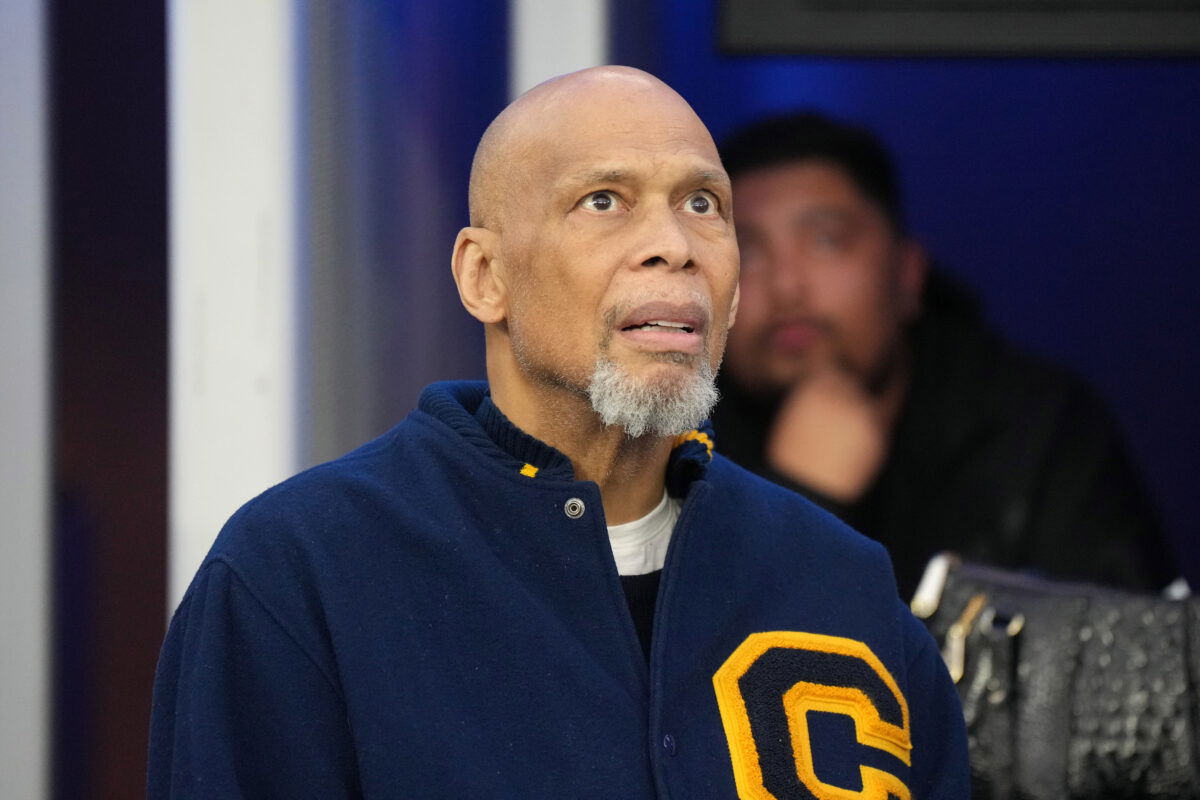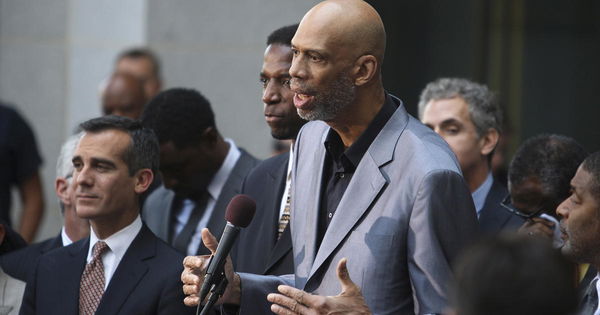
USA Today via Reuters
Dec 3, 2023; Inglewood, California, USA; Kareem Abdul-Jabbar attends the game between the Los Angeles Rams and the Cleveland Browns at SoFi Stadium. Mandatory Credit: Kirby Lee-USA TODAY Sports

USA Today via Reuters
Dec 3, 2023; Inglewood, California, USA; Kareem Abdul-Jabbar attends the game between the Los Angeles Rams and the Cleveland Browns at SoFi Stadium. Mandatory Credit: Kirby Lee-USA TODAY Sports
Kareem Abdul-Jabbar’s fight for social justice is over 5 decades long. The six-time NBA champ and former all-time leading scorer (until 2023) has done it just as famously as he played basketball. His activism started in 1967 when the 20-year-old rising star stood with Muhammad Ali at an important meeting of Black athletes supporting Ali’s protest against the Vietnam War. But over the years, the 78-year-old did much more. He became known as a serious thinker, writing many books about fairness and democracy. And that sure has left its impact.
Watch What’s Trending Now!
In 2012, the State Department, under President Obama’s administration, honored him by making him a global cultural ambassador. Just three years prior, he started the Skyhook Foundation to help underprivileged kids learn science and math. Long before other athletes spoke up, Kareem was working for voting rights and better policing. Through movies and media, he continues to share significant Black stories that often get ignored.
Kareem’s legendary journey began at one of America’s most prestigious institutions, the University of California, Los Angeles (UCLA). He arrived on campus in 1965 as Lew Alcindor. No one could have predicted how those college years would transform the shy freshman into a legend both on and off the court. UCLA became the place where Kareem found his voice. Now, all these years later, he revisited his origins by bringing his 20th book to UCLA.
ADVERTISEMENT
In Q&A With Kareem Abdul-Jabbar ʼ69, there was a question: “You have a deep history with UCLA; what’s the significance of you launching this book in Westwood?” Kareem Abdul-Jabbar responded with a humbling honesty, “UCLA was where the adult version of me was born. Coach Wooden taught us basketball, sure, but mostly he was interested in teaching us how to be good, moral men. He taught us discipline and drive, but also compassion and courage.”
When John Wooden recruited Abdul-Jabbar, he not only asked the 7-foot-2 to focus on enhancing his game, but he also asked him to focus on education. It was then that he knew that his coach was different. Be it learning from the then youngster to giving him advice, Wooden shaped the human that Kareem is today. And when his mother passed away in 1997, Kareem talked at length to his former coach, just like they had when Wooden’s wife had passed away in 1985. And when his coach finally overcame his depression, it was Kareem he had called to inform that he had found his purpose again.

Reuters
Retired basketball star Kareem Abdul-Jabbar speaks as Los Angeles Mayor Eric Garcetti (L) stands by at a news conference outside City Hall, after National Basketball Association Commissioner Adam Silver made an announcement regarding Los Angeles Clippers owner Donald Sterling, in Los Angeles, California, April 29, 2014. REUTERS/David McNew (UNITED STATES – Tags: SPORT POLITICS) – RTR3N57Q
Moving on, in a way, he accepted that the campus became his crucible, transforming raw talent into principled leadership. He went on to break down what exactly contributed to his growth: “My classes honed my mind, making me more educated in history, a better critical thinker, and taught me how to be a better writer.”
ADVERTISEMENT
However, that wasn’t all that helped him. “My interaction with other students developed my sense of community and commitment to larger causes that affected everyone, not just me personally.” Really, it’s a powerful reminder that the people who surround us during our formative years often leave a lasting imprint. Their values, struggles, and conversations can add to who we become and what we choose to stand for. And that reflects in all that the former basketball player does.
ADVERTISEMENT
Kareem Abdul-Jabbar’s actions, not just words
Kareem Abdul-Jabbar didn’t just speak about justice, he lived it even when the stakes were sky-high. “Certain things needed to be said, and I decided that I would say them,” he declared on CBS Mornings. It’s a feeling that has driven him since his UCLA days. There he marched after Dr. King’s a———— despite bystanders telling him, “What are you demonstrating about? You’re gonna be in the NBA.” Their ignorance only fueled him. By 1968, his words became action.
He stood with Muhammad Ali after witnessing how Black champions were treated and boycotted the Olympics. “He goes and represents the U.S. in Rome and is outstanding, but he can’t buy a sandwich,” Abdul-Jabbar recalled. Ali’s humiliation, when he was denied service despite his gold medal, was a turning point. For Kareem, activism wasn’t optional; it was a moral duty, even if it made him a target. “It’s like I’m a lightning rod,” he admitted. While referencing death threats he’s endured since he was 17. Yet he never backed off.
ADVERTISEMENT
Whether supporting Ali’s draft resistance or condemning modern injustices, Abdul-Jabbar’s activism isn’t theoretical. It delivers.
ADVERTISEMENT
ADVERTISEMENT
ADVERTISEMENT